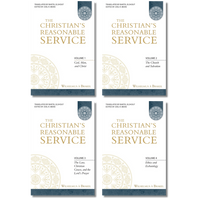
The Christian's Reasonable Service, Volume 3: The Law, Christian Graces, and the Lord's Prayer (Brakel)
- Affordable shipping (free $100+)
- 100,000+ customers served
- "Wonderful books, great prices, awesome customer service." – Ivan, IL
Description
First published in 1700, The Christian’s Reasonable Service (De Redelijke Godsdienst) ran through twenty Dutch editions in the eighteenth century alone! The title is derived from Romans 12:1, “I beseech you therefore, brethren, by the mercies of God, that you present your bodies a living sacrifice, holy, acceptable unto God, which is your reasonable service.” It expresses what God requires from man, and particularly from the Christian, that he serve Him in Spirit and in truth—intelligently, rationally, and in harmony with and response to God’s revelation of Himself, His Word.
With a decidedly Puritan flavor and representing Reformed experiential religion at its best, Wilhelmus à Brakel systematically moves through the major doctrines of the Bible in hopes of seeing the minds of God’s people renewed for the purpose of promoting godliness. Throughout his work, but particularly in the practical application of each doctrine, à Brakel strives unceasingly to exalt the name of Jesus as the name that the Father has given above every other name—there being no other name given under heaven among men whereby we must be saved (Acts 4:12).
Contents
Soteriology: The Doctrine of Salvation (cont.)
44. Sanctification and Holiness
45. The Law of God: General Considerations
46. The First Commandment
47. The Second Commandment
48. The Third Commandment
49. The Fourth Commandment
50. The Fifth Commandment
51. The Sixth Commandment
52. The Seventh Commandment
53. The Eighth Commandment
54. The Ninth Commandment
55. The Tenth Commandment
56. The Glorification of God
57. Love Toward God
58. Love Toward the Lord Jesus
59. The Fear of God
60. Obedience Toward God
61. The Exercise of Hope in God
62. Spiritual Strength or Courage
63. The Profession of Christ and His Truth
64. Contentment
65. Self-denial
66. Patience
67. Sincerity (or Uprightness)
68. Prayer
69. The Lord’s Prayer Explained and Applied; The Address and the First Petition: Hallowed Be Thy Name
70. The Second Petition: Thy Kingdom Come
71. The Third Petition: Thy Will be Done
72. The Fourth Petition: Give Us This Day Our Daily Bread
73. The Fifth Petition: Forgive Us Our Debts as We Forgive Our Debtors
74. The Sixth Petition: Lead Us not into Temptation, but Deliver Us from Evil
Endorsments
“Wilhelmus à Brakel’s The Christian's Reasonable Service is a tremendously insightful work that showcases the marriage between scholastic precision and a warm pastoral piety. À Brakel not only challenges the mind as he plumbs the depths of the teachings of Scripture, but he also challenges the heart as readers must grapple with the truth and its implications for their growth in grace. Not only can historians read à Brakel to learn about historic Reformed theology, but scholars, pastors, and laymen can all benefit from a close reading of these wonderful volumes.”
—J. V. Fesko, Academic Dean and Associate Professor of Systematic Theology, Westminster Seminary California
“With its fine balance of Reformed doctrinal statement and application to Christian life and personal piety, à Brakel’s Christian’s Reasonable Service provides a superb illustration of the theological project associated with the late seventeenth century development of the Dutch Nadere Reformatie, or ‘Further Reformation.’ Although it abounds in sound definition and detailed exposition, this vernacular theology was intended not for the academic setting but for the purpose of educating the laity in both faith and practice. It remains a significant study in Reformed theology even as it exemplifies the true sense of the old Reformed maxim, Ecclesia reformata semper reformanda—namely, that the doctrine of the church has been reformed but the life of the Christian is always to be reformed, guided by the teachings of the Reformation. The Elshout translation beautifully conveys the sense and the spirit of à Brakel’s work.”
—Richard A. Muller, P. J. Zondervan Professor of Historical Theology, Calvin Theological Seminary
“No systematic theology compares to Wilhelmus à Brakel’s The Christian’s Reasonable Service for its explicit concern to weld the objective and subjective in theology. Emerging from the Dutch Further Reformation, à Brakel is without equal in exploring both the intricate details of the Reformed theological system whilst ensuring that at every turn theology is done in the interests of piety and the glory of God. In an era when the subjective has either been lost in a sea of postmodernity or viewed with suspicion for its apparent lack of academic integrity, only those who have never read this monumental treatise would dismiss it as guilty of either. An achievement to place alongside Calvin’s Institutes and the systematic theologies of Turretin, Hodge, and Berkhof.”
—Derek W.H. Thomas, John E. Richards Professor of Theology, Reformed Theological Seminary.
About the Author
Wilhelmus à Brakel was born on January 2, 1635 in Leeuwarden, the Netherlands. He studied theology at the universities in Franeker and Utrecht and was particularly influenced by his mentor, Gisbertus Voetius. He served four congregations in his native province of Friesland: Exmorra (1662–1665), Stavoren (1665–1670), Harlingen (1670–1673), and his birthplace, Friesland’s capital, Leeuwarden (1673–1683). His Friesland period, however, proved to be a preparation for the great task the Lord had laid away for him in Rotterdam—his final and longest pastorate (1683–1711). After a fruitful ministry of forty-nine years, it pleased the Lord to take this eminent divine—affectionately referred to by the godly as “Father Brakel”—home to Himself in 1711 at the age of seventy-six, to receive the reward of a faithful servant.









